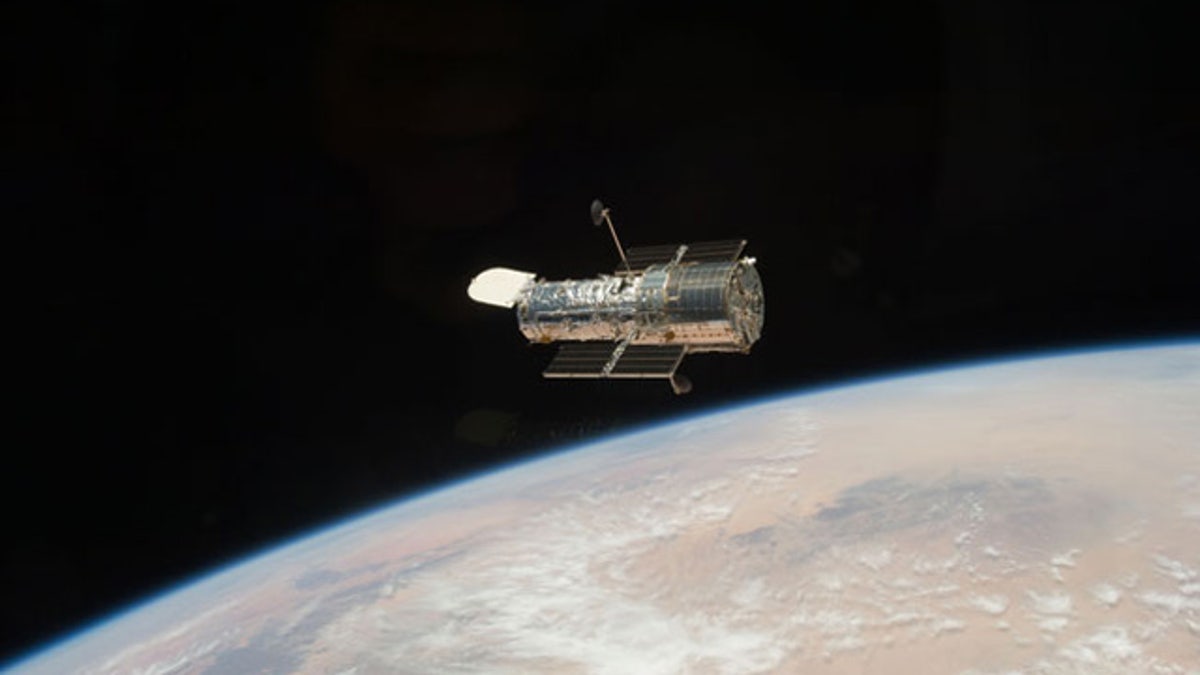
The Hubble Space Telescope, seen here in orbit above the Earth, after it was released from the shuttle Atlantis at the close of the STS-125 servicing mission in May 2009. (NASA)
The star of the Warner Brothers' new IMAX film "Hubble 3D" was missed Tuesday evening at the movie's world premiere at the Smithsonian National Air and Space Museum but for good reason: it was orbiting 350 miles above Earth.
The Hubble Space Telescope's absence notwithstanding, the celebration saw the film's co-starring astronauts walk the red carpet to see for the first time the telescope's 'life story' unfold on the museum's five-story screen here.
The movie's debut, which traded Hollywood stars for the celestial variety, featured the NASA astronaut crew of the fifth and final space shuttle Hubble servicing mission who in May 2009 repaired and upgraded the telescope while also filming their work using an IMAX 3D camera mounted in Atlantis' payload bay.
"It's like experiencing the flight one more time," STS-125 mission commander Scott Altman told collectSPACE.com before the screening. "I can't wait to go there again."
Altman, who with spacewalkers John Grunsfeld and Mike Massimino, pilot Greg C. Johnson, and mission specialist Megan McArthur attended the premiere, also shot scenes from inside the orbiter using HD cameras, which were then digitally upsized for the large-format film.
"Probably the only frustrating thing about flying in space, or sad thing, is that you can't share everything that you see there with everybody," shared Massimino from the red carpet. "This format gives us an excellent opportunity to share this experience with many people."
The seventh film from the IMAX "space team" led by Toni Myers, "Hubble 3D" offers audiences a unique look at the space telescope's legacy and how it has changed our view of the universe.
"I like them all," Myers told collectSPACE.com about her prior six films that were set -- and often filmed -- in space, "but this one is certainly breaking new ground in terms of technical challenges."
In addition to incorporating the footage that the astronauts captured, Myers collaborated with the imaging team at the Space Telescope Science Institute in Baltimore, Md., and the Advanced Visualization Laboratory at the University of Illinois at Urbana-Champagne to use the data returned by Hubble to create a series of scientifically realistic flights that "unfold on screen like a guided tour of the universe."
Said Myers, "I think any film that flies you to the edge of the observable universe is... a new achievement."
Or as IMAX CEO Rich Gelfond put it, "we first took you into space, we looked at the Earth, and now we look at the edge of the universe."
The deep space scenes aside, the film also steps viewers through a series of journeys that occurred much closer to home -- the NASA shuttle missions that deployed and later serviced the space telescope. Specifically, "Hubble 3D" pulls from footage shot for IMAX's 1994 "Destiny in Space," which showed the 1990 deploy of the observatory and the 1993 mission to repair its famously flawed mirror by installing a set of corrective "contact lenses".
"With the disappointments of the first [mirror] problems, and then the difficulties of keeping it alive over the years as various instruments failed, it is just a constant drama," said executive producer and IMAX co-founder Graeme Ferguson. "It makes for a natural movie."
The premiere, which concluded with a cocktail party under a full-scale engineering model of the Hubble telescope and nearby one of the observatory's instruments replaced and returned to Earth by Atlantis' astronauts, drew an invited audience of more than 500, including several members of Congress and NASA's Deputy Administrator, Lori Garver.
"This [film] really brings to the public what the taxpayers have paid for, not only seeing the research which is widely distributed through the Hubble's Space Telescope Science Institute, but also to experience it up close and personal," said Garver.
The public will get its chance to see "Hubble 3D" when it opens in IMAX and IMAX 3D theaters worldwide on March 19. Narrated by actor Leonardo DiCaprio (who was unable to attend the premiere), "Hubble 3D" runs 43 minutes long.
Copyright © 2010 Space.com. All Rights Reserved. This material may not be published, broadcast, rewritten or redistributed.
